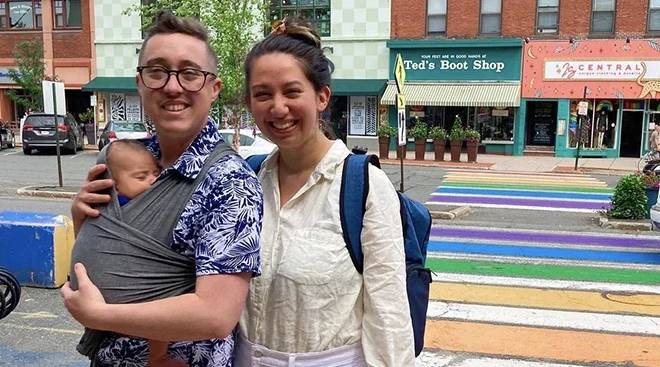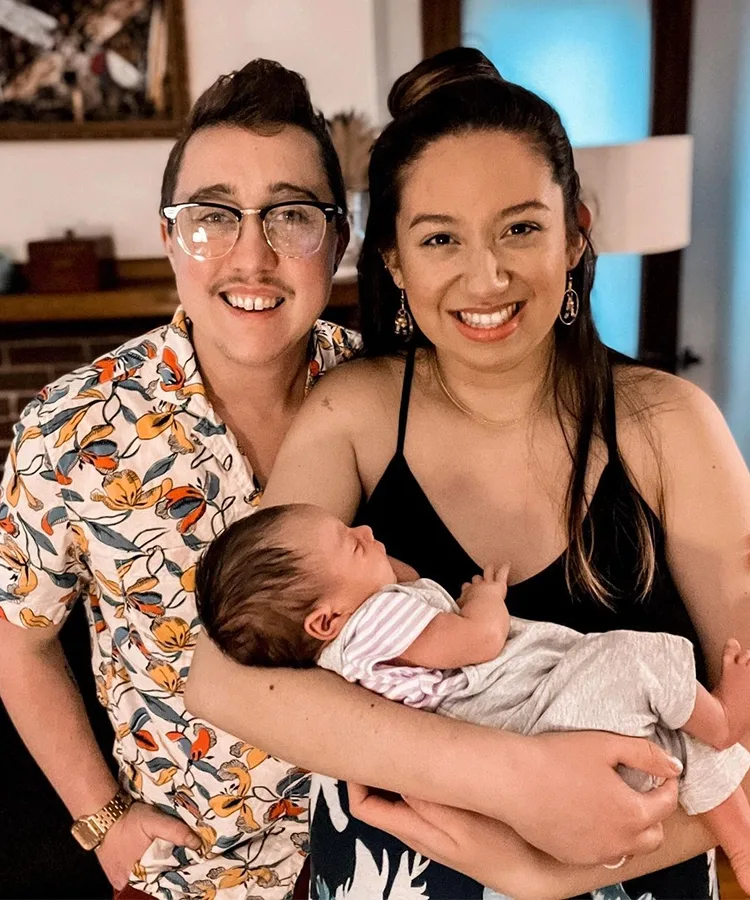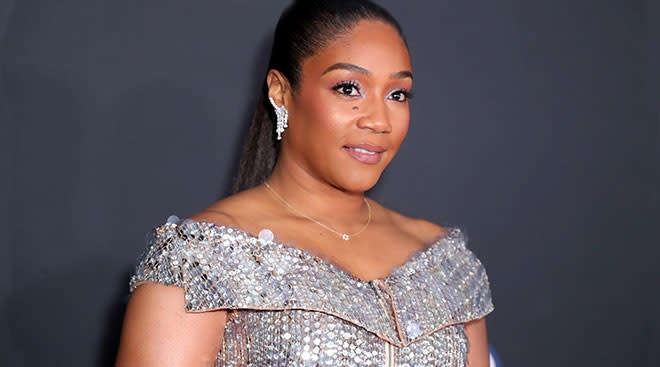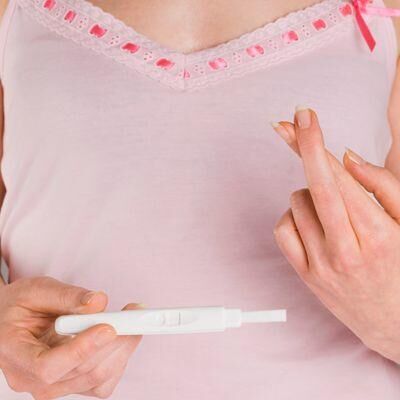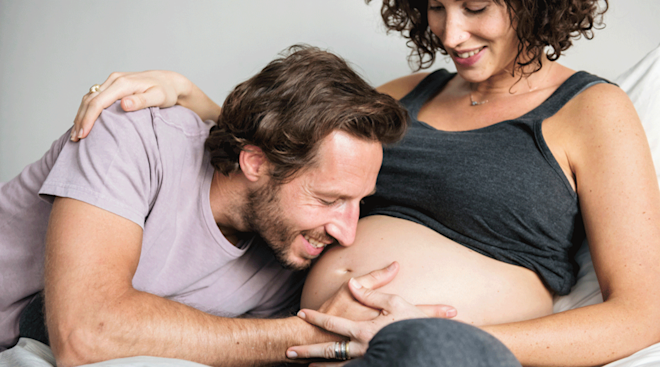Overcoming Barriers and Bias on Our Path to Parenthood
We first called the fertility clinic in the fall of 2020. My spouse, Caid, and I sat together, excited to begin the process we’d been talking about for years. The possibility of having a family was one of the first “serious” conversations we had as a couple. We knew some science would be involved, seeing as I am a cis-gender woman and Caid is a non-binary queer person assigned female at birth. We determined early on that reciprocal IVF was the way we were going to have a baby together. We decided we’d use Caid’s egg, a sperm donor with certain genetic specifications and a similar ethnic background to mine, and that I would carry the pregnancy.
It wasn’t long into the phone call with the financial counselor at the clinic (we’ll call her D), that we discovered that the limited support available for people pursuing in vitro fertilization was not meant for us. We had excellent healthcare coverage. We lived in a state that had both IVF and transgender healthcare insurance mandates. I had a spouse who could navigate the healthcare bureaucracy like nobody’s business. We even knew multiple people on the same insurance plan who had successfully achieved pregnancy via IVF. If there was a way to get coverage, we were going to find it.
But we could hear the regret in D’s voice as she informed us that, despite the benefits we had, insurance would almost certainly deny our claims. She said that she’d do her best to advocate for us. Simply put, our family didn’t match the specified criteria of our state’s IVF insurance mandate. In other words, we were not a cis-gender, heterosexual couple—so IVF couldn’t be deemed “medically necessary.”
D kept her word, and worked hard to get any part of our treatments covered by insurance. Per our clinic’s policy, we weren’t able to begin scheduling the egg-retrieval appointments until insurance pre-approved the procedure. Thanks to the many hours D spent on the phone with our insurance, all the coverable parts of Caid’s procedures were eventually greenlit.
Of course, when it came time for insurance to actually pay, we started getting flooded with denial letters. A large portion of the process for the egg retrieval was ultimately denied, despite the pre-approvals. The gist of these letters? “You have not had exposure to sperm over the past year, with an inability to conceive or produce conception or sustain a successful pregnancy during the same year period.”
After weeks and countless hours on the phone with insurance, setting up peer-to-peers, explaining our situation and defending our “medical necessity,” we finally got someone to talk to our fertility clinic again. D and our doctor explained that it was all medically necessary. But an insurance representative informed them that none of the egg-retrieval process should have been covered in the first place, and that if this conversation continued, they’d reverse all of it.
It was beyond disheartening. We were prepared for the several out-of-pocket expenses IVF would entail and the emotional rollercoaster of the process. But we were not prepared to pay for our pre-approved costs.
I had considered myself to be rather cognizant of the adversities of the LGBTQ+ community and the hidden discriminations all societal structures hold for queer people. I have experienced the expected, everyday discriminations any cis-queer woman has, the annoying encounters and have held space and advocated for those who have encountered far worse than me. I’ve seen close friends struggle to get the healthcare they need to survive—just because of who they are. To discover a new version of inequity was an isolating, unsettling experience.
Fortunately, with some penny-pinching, a discount pharmacy and a 401k loan, we were able to successfully retrieve the eggs, and ended up with viable embryos. Despite the disappointment and disruption this all caused, we knew we were among the privileged minority of queer folks to even get to this point in the process—and for that we were (and still are) very grateful.
Some more good news came: In the midst of our egg-retrieval efforts, our state passed a new parentage act. Prior to this, a non-gestational parent would have no established legal bond to a baby, even if they were the one genetically related to them. They’d still have to adopt their own child—a baby that their legally married partner gave birth to—through a process called second-parent adoption. This required a lawyer, legal fees and in-home inspections. Thankfully with the passing of this act, Caid would no longer have to adopt our future baby. This was a big win for our community, and knowing that there are people in our state advocating for families like ours boosted our spirits as we entered the next part of our journey.
In a lab, sitting on ice, were our healthy embryos. Our next and (sort of) final step was the embryo transfer. We were assured this would be a covered expense. This part is almost always covered by insurance, no matter the situation—how else is your embryo getting into a uterus?
But the denial letters came yet again, citing the same language about not being exposed to sperm, and using what should be our state’s bare minimum for treatment as their absolute maximum.
At this point, we were financially fatigued. We reached as deep into our pockets as we could to get this far, and any further would be irresponsible. This cost would put us over the edge. After hours of deliberation and persuading from our friends, family and even therapists, we decided to let them help us. We let our family set up a GoFundMe for the last step of our IVF process. This was an important lesson in learning to accept help.
We watched support and love pour in. Overwhelmed with the generosity of our friends, family, community and kind strangers, we reached our goal in a matter of days. So many people shared in our outrage over the injustice that brought us to this point. Not everyone knows the nuances of queer rights or accessibility to healthcare, but we found that family and parenthood is a shared language.
Almost a year later, I am able to write this all while my sweet, healthy newborn baby is snuggled against my chest. As much as reading those denial letters and old emails still fuels my anger, I’m thankful that I’m able to share my story about the obstacles that most people don’t even know about. Even with all the advantages we had, we were still denied what a cis-het couple would have been granted.
Hopefully reproductive equality will be a barrier the LGBTQ+ community can overcome in the near future, and all queer parents will have the same safety and rights any legal parent has. In the meantime, I urge anyone facing injustices on the path to parenthood to lean on their community. And let those who need a shoulder lean on you too.
This is just the beginning of my experience in queer parenthood, and there will be more obstacles to come—and so many more beautiful moments too. Parenthood is scary, disappointing, thrilling and wonderful for any parent, no matter who you are or who you love.
About the author:
Reanna Murray is a proud reciprocal IVF mama, happily building home and community with her spouse and newborn in New England. As she ventures into motherhood, she hopes to reach other parents and parents-to-be in their journeys in conception, pregnancy, birth and conscious parenting. You can follow her on Instagram at @reannalorenmurray.
Plus, more from The Bump:
Navigate forward to interact with the calendar and select a date. Press the question mark key to get the keyboard shortcuts for changing dates.
































